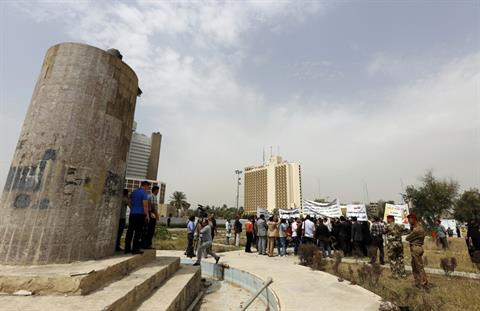 Iraqis gather in Baghdad's Firdoos Square on April 8, 2014. AFP PHOTO / SABAH ARAR[/caption]
Iraqis gather in Baghdad's Firdoos Square on April 8, 2014. AFP PHOTO / SABAH ARAR[/caption]BAGHDAD: Attacks in�Iraq�left 12 people dead Tuesday while security forces said they killed 25 militants near�Baghdad�amid worries insurgents are encroaching on the capital weeks ahead of elections.
The latest violence is part of a protracted surge in nationwide bloodshed that has left more than 2,400 people dead since the start of the year and sparked fears�Iraq�is slipping back into the all-out sectarian conflict that plagued it in 2006-07.
The unrest has been driven principally by anger in the�Sunni�Arab community over alleged mistreatment at the hands of the Shiite-led government and security forces, as well as spillover from the civil war in neighbouring Syria.
In Tuesday's bloodiest incident, soldiers killed 25 militants in an ambush southwest of Baghdad, the capital's security spokesman�Brigadier General Saad Maan�said.
Maan said the fighters were part of the jihadist Islamic State of Iraq and the Levant (ISIL), and that they were planning to attack an army base that they had attempted to hit last week.
Despite the tactical success, the killings illustrate the growing ambition of ISIL militants in seeking to breach into Baghdad, with analysts and officials worrying that they are seeking to derail April 30 elections.
Elsewhere in Iraq on Tuesday, attacks north of the capital killed 12 people, security and medical officials said, including six members of the same family shot inside their home on the outskirts of the restive city of Mosul.
A car bomb set off by a suicide attacker at a checkpoint in the restive city of Tuz Khurmatu killed a policeman, while attacks also struck against Baiji and Tikrit in Salaheddin province.
Diplomats and analysts have urged the government to reach out to the�Sunni�community to undermine support for militancy.
But with the parliamentary elections looming, Prime Minister Nuri al-Maliki and other Shiite leaders have been loath to be seen to compromise.
Near-daily bloodshed is part of a long list of voter concerns that also include lengthy power cuts, poor wastewater treatment, rampant corruption and high unemployment.
By The Daily Star
The Iran Project is not responsible for the content of quoted articles.











